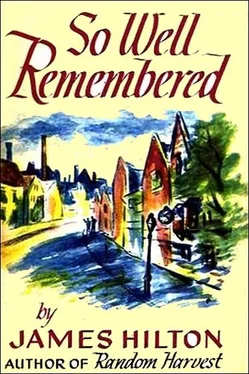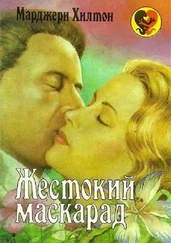Джеймс Хилтон - So Well Remembered
Здесь есть возможность читать онлайн «Джеймс Хилтон - So Well Remembered» весь текст электронной книги совершенно бесплатно (целиком полную версию без сокращений). В некоторых случаях можно слушать аудио, скачать через торрент в формате fb2 и присутствует краткое содержание. Год выпуска: 1945, Жанр: Проза, на английском языке. Описание произведения, (предисловие) а так же отзывы посетителей доступны на портале библиотеки ЛибКат.
- Название:So Well Remembered
- Автор:
- Жанр:
- Год:1945
- ISBN:нет данных
- Рейтинг книги:5 / 5. Голосов: 1
-
Избранное:Добавить в избранное
- Отзывы:
-
Ваша оценка:
- 100
- 1
- 2
- 3
- 4
- 5
So Well Remembered: краткое содержание, описание и аннотация
Предлагаем к чтению аннотацию, описание, краткое содержание или предисловие (зависит от того, что написал сам автор книги «So Well Remembered»). Если вы не нашли необходимую информацию о книге — напишите в комментариях, мы постараемся отыскать её.
So Well Remembered — читать онлайн бесплатно полную книгу (весь текст) целиком
Ниже представлен текст книги, разбитый по страницам. Система сохранения места последней прочитанной страницы, позволяет с удобством читать онлайн бесплатно книгу «So Well Remembered», без необходимости каждый раз заново искать на чём Вы остановились. Поставьте закладку, и сможете в любой момент перейти на страницу, на которой закончили чтение.
Интервал:
Закладка:
Even George’s early education, which was poor enough, had had a few passable things in it; indeed, at the old-fashioned prison-like elementary school he was taught reading, writing, spelling, and arithmetic far more thoroughly than were the youngsters in the luxurious modern school that George persuaded the Council to build years later. But there was a drawback to the thoroughness, for the teacher, a Mr. Rimington, was dull-witted enough to think history and geography ‘easy’ subjects, and therefore somewhat to be despised. All George learned of the former was that somebody was a ‘good’ king and somebody else a ‘bad’ one, plus a few scraps of information such as that Henry the Second never smiled again and that Oliver Cromwell had a wart on his nose; while geography consisted largely of memorizing ‘what belongs to England’, and of copying maps—an occupation which Mr. Rimington approved of because it took so long and kept the class quiet. He was also dull-witted enough to think that a boy who turned over a page during a reading lesson without waiting for the order to do so was guilty of a serious breach of discipline. George had been punished for this once or twice, after which he hated and feared Mr. Rimington and formed a self-protective habit of concentrating his attention and disengaging his intelligence whenever he crossed the school threshold. Not till years afterwards when, as Chairman of the Browdley Education Committee, he had the task of choosing applicants for teaching posts, did he realize that Mr. Rimington had made himself thus terrifying because when he first became a teacher the rougher products of Browdley homes had terrified HIM.
And now, as the father of the product of another Browdley home, George turned over in his mind his own childhood memories, not without a certain nostalgia, but with a resolute determination that Martin’s early life should contain happier ones. He remembered the crowded house in Mill Street, his mother’s continual nagging (behind which he had failed to diagnose the harassed affection that was really there), his father’s doomful voice at home and from the pulpit; the canal-bank where he sneaked off to play when his father was at work and his mother was ill (the only time of real freedom he enjoyed); the elementary school round the corner and Mr. Rimington’s classroom, with its torn maps and dirty walls, the smell of wet clothes and steaming water-pipes in winter, and of sweat in summer; the slabs of dust-laden sunlight into which he so often stared after finishing tasks adjusted to the speed of the stupidest pupil; terrifying Mr. Rimington himself, and the not- quite-so-terrifying headmaster, old ‘Daddy’ Simmons, whose habit, fascinating to all, was to stick his little finger into his ear and waggle furiously; and the paragraph in the tattered reading-book that said: “Harrow is one of the great schools of England. Many famous Englishmen went there when they were boys. Some of them carved their names on the school desks, and these names can still be read. You must not carve your name on your school desk, but you can make up your mind to become a famous Englishman when you grow up…”
George’s own ambitions, even if he should ever become both a member of Parliament and a Bachelor of Arts, had never permitted themselves to soar as far as being ‘a famous Englishman’. But for Martin… why not? What obstacles were there? Surely not boyhood in Browdley, since winning scholarships was no harder from there than from anywhere else. Perhaps Martin might win such scholarships—not to Harrow (for George, though he could admire some of their products as individuals, was of the opinion that public schools encourage snobbery), but to Oxford—or Cambridge, at least. That faint preference in favour of Oxford was nothing but a recollection of Gladstone’s Double-First.
There came a day when Martin seemed old enough to be taken by his father to the Browdley Town Hall, there to imbibe some vague first impression which George could hardly seek to clarify at such an early age, but which would later, he hoped, inspire the lad to an interest in civics, local government, the history of his country, the parliament of man, and the federation of the world. (After all, there was no limit to the effects of a child’s first impression.) So George held the boy lovingly in his arms in front of the rather bad stained-glass window in the main lobby of the Town Hall— stained glass depicting a woman carrying some sheaves of wheat in one hand and what looked like a coffee-grinder in the other (“mechanical power”, it was supposed to represent); he hoped Martin would at least notice the bright colours. And in due course the child’s eyes rounded with all the excitement, nay more than the excitement that George had hoped for, but unfortunately those eyes were not on the stained glass at all.
George looked down and saw a large rat scampering across the Town Hall floor.
He was horrified, not only that the child should have seen such a thing, but that such a thing should exist; it argued bad drains or something— he would certainly bring the matter up at the next meeting of the Building Committee.
But Martin was by no means horrified. He knew nothing about rats, but perhaps he thought that what he had seen was some extremely swift and fascinating kind of pussy-cat (for pussy-cats WERE known to him), and with this to wonder about, the visit to the Town Hall did indeed enshrine an experience.
Martin loved his father less than his mother and perhaps even than Becky, but George did not mind this, reflecting magnanimously that the balance would be evened up later on. After all it was a result of the physical contacts of mother and child, the domestic routine, the humble, seriocomic intimacies; and Livia made a perfect mother—unexpectedly so, indeed. It was as if all the nonsense that cropped up so often in her behaviour with adults was resolved into complete naturalness between herself and Martin; she never raised her voice to him, or was angry, or even irritated. In an odd way she gave the appearance of being with the boy in his own world, rather than of looking into it from hers; perhaps there was a sense in which she had never grown up herself, or perhaps it was just the animal quality in her that George had noticed before, that extraordinary paradoxical knack of being shameless and fastidious at the same time. When George came upon his wife and child romping together, he sometimes felt that to make them even aware of him was an intrusion, the breaking of a lovely spell, and he would tiptoe away rather than do this; for again he was able to fortify himself by thinking that his own time would come later.
One night, as he sat with a book in his study, the impulse came to write something that might, if anything untimely should happen, be a help to the boy or at least a reminder that a man had once existed who had dreamed things about him and hoped things for him; and in this mood, rare because of its slightly melancholy flavour, George wrote:
“Everything depends on childhood, Martin, and if you ever have children of your own, remember that, just as I, remembering my childhood, intend to make yours good to remember. When I was a boy of seven my parents died and I went to live with an uncle who kept a newspaper and stationery shop in Shawgate, and living in his house gave me, I think, the germ of all my later interest in printed things—perhaps even in politics too, because it so happened that at the time of my arrival there was an election in progress, and Uncle Joe, who was a Liberal (the only thing he had in common with my father), sent me out to distribute hand-bills. All I had to do was to walk about Browdley slipping them under doors and through letter-boxes, yet I don’t think the world was or ever could be more wonderful to me than during those few weeks. I kept hearing about some mysterious person called the Candidate, who was opposed in some mysterious way to another person who was called the Other Candidate, and it seemed to me that the great battle of Good and Evil was being fought in the streets of this town, and that I and my uncle were soldiers fighting it. I suppose it was then, before I really knew what things were all about, that I had the first hankering that made me later decide to go on fighting the same sort of battle when I grew up. And if that’s a strange reason for a young man to enter politics, then perhaps it isn’t the real reason, but just the flick of a button in the signal-cabin that can send a train to any one of a hundred different places.
Читать дальшеИнтервал:
Закладка:
Похожие книги на «So Well Remembered»
Представляем Вашему вниманию похожие книги на «So Well Remembered» списком для выбора. Мы отобрали схожую по названию и смыслу литературу в надежде предоставить читателям больше вариантов отыскать новые, интересные, ещё непрочитанные произведения.
Обсуждение, отзывы о книге «So Well Remembered» и просто собственные мнения читателей. Оставьте ваши комментарии, напишите, что Вы думаете о произведении, его смысле или главных героях. Укажите что конкретно понравилось, а что нет, и почему Вы так считаете.










